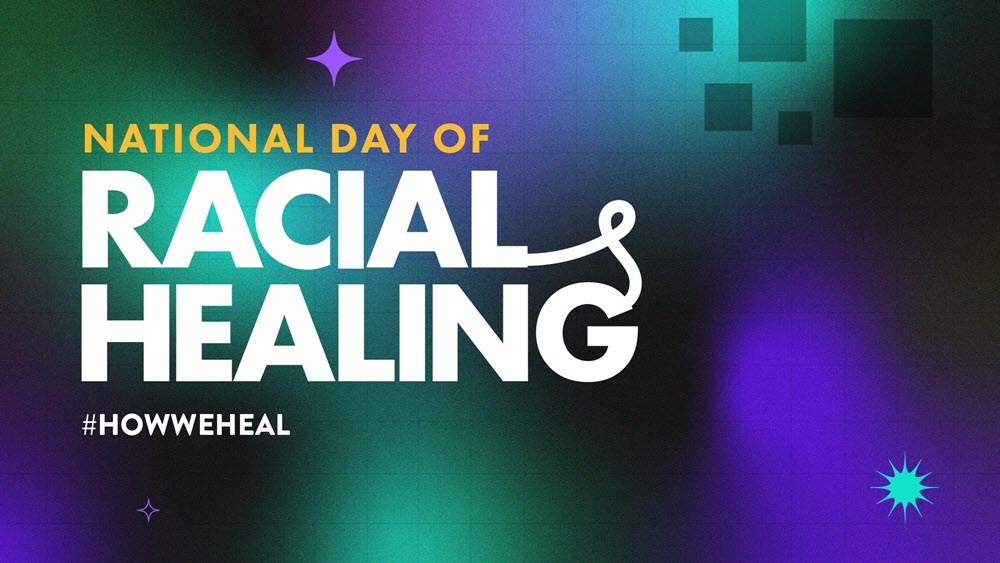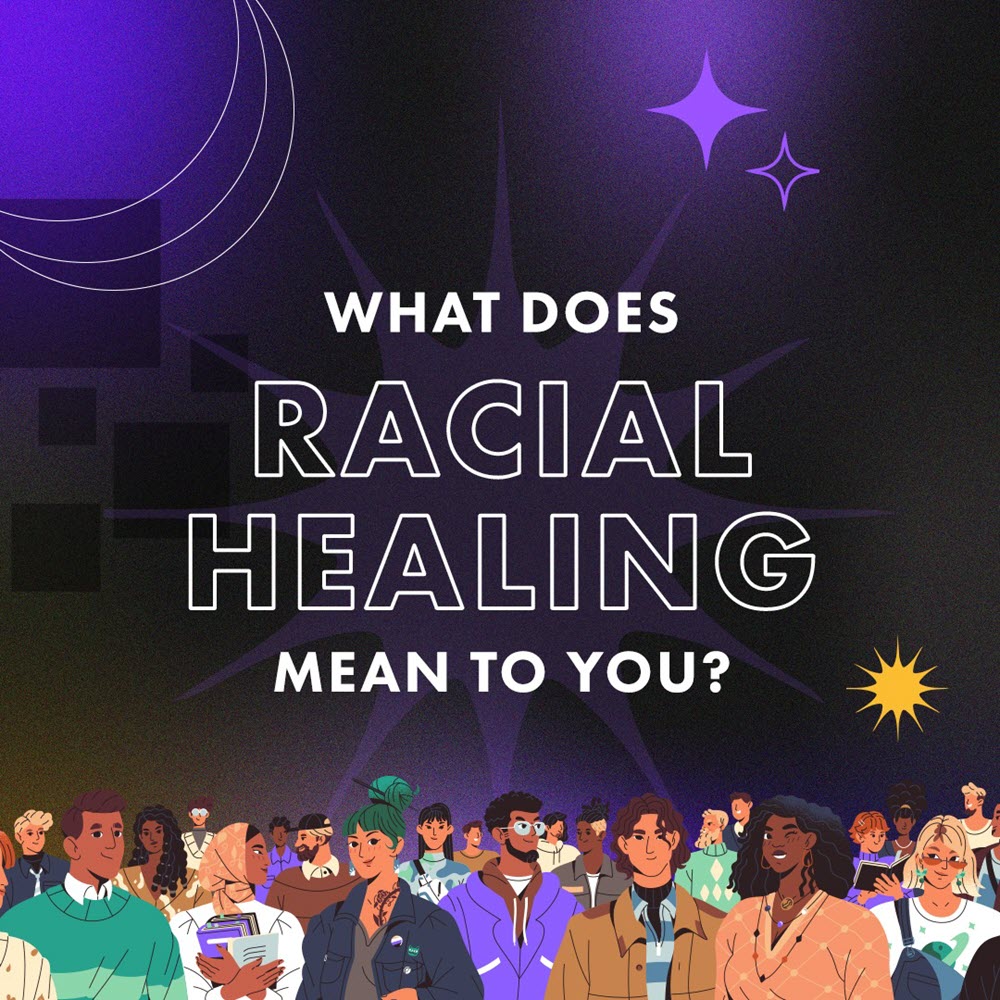2025 National Day of Racial Healing
The National Day of Racial Healing (NDORH) is an opportunity for people, organizations, and communities to call for racial healing, bring people together in their shared humanity and take action together to create a more just and equitable world.
NDORH was created by W.K. Kellogg Foundation in 2017, building on the work and learnings of the Truth, Racial Healing & Transformation (TRHT) initiative, to support a national and community-based process to plan for and bring about transformational and sustainable change, and to address the historic and contemporary effects of racism.
The National Day of Racial Healing is observed every year on the Tuesday following Martin Luther King, Jr. Day. Read on for resources and strategies that libraries can use to encourage community participation in this year's National Day of Racial Healing, on January 21, 2025.
How to Participate
The 2025 website features new ideas and resources to help plan your event or find ways to participate. Some ways you can get involved include:
- Use these Event and Activity Ideas guides with suggestions for creating engaging racial healing experiences year-round.
- Event and Activity Ideas for Children, Youth and Communities (pdf)
- The Healing Power of the Arts: A Guide for Artists, Media-makers & Communities (pdf)
- Event and Activity Ideas for Professional Settings (pdf)
- Event and Activity Ideas for Policymakers (pdf)
- Organize a conversation in a community space. Use the provided conversation guide (PDF) to help facilitate a meaningful conversation.
- Use the Suggested Checklist for Planning a National Day of Racial Healing Event/Activity (PDF) to plan for a larger public event. Don't miss the Digital Toolkit (pdf) with graphics and templates for social communications.
- Watch one of the many videos in the NDORH collection, including the series made available on MSNBC and Noticias Telemundo, broadcast in partnership with NBCUniversal.
- Find other ways to Take Action, or Submit Your Event, to share as part of NDORH!
10 Ways Your Library and Community Can Recognize NDORH
1. Promote relevant and inspiring books through displays and recommendations lists. Here are some lists to explore:
- Saint Paul Public Library's Resources on Race
- A Collection of Diverse Book Lists, from WeNeedDiverseBooks.org
- Resisting Racism, a research guide from University of Washington Libraries
- ADL’s Children’s Literature List
- Unity, Kindness and Peace Booklist (PDF) from the American Library Association
- Together We Heal: A Reading List from Chicago Public Library
- Staff-created book list from Indianapolis Public Library
- Baldwin Celebrates the National Day of Racial Healing, a collection of booklists in various categories including fiction, non-fiction, graphic novels and media for both children and adults.
2. Invite your library book club to select a book to read in honor of NDORH, or use the day to invite the whole community to begin to read the same book. Here’s how a book club in Battle Creek, Michigan got involved in a previous year.
3. Host a discussion at the library in collaboration with other local community organizations. Use the NDORH Conversation Guide (PDF).
4. Host a film screening or other cultural event like storytelling or musical performances.
5. Dedicate a space in the library for people to share their declarations, “I will promote racial healing by _____” or "My racial healing looks like _____.” Use a white board or wall, or see this example from a previous year of an invitation to post selfies on social media.
6. Explore WebJunction's Access & Equity topic area to see how libraries and their communities are increasing inclusion and advancing racial equity. Begin with Racial Equity in the Library, Part One and Part Two.
7. Submit your event or find another near you, via the NDORH website.
8. Engage in social media with the W.K. Kellogg Foundation Facebook page, and on X (Twitter) @WK_Kellogg_Fdn and Instagram @kelloggfoundation using the NDORH hashtag: #HowWeHeal.
9. Review resources compiled by librarians and archivists to spark your thinking:
- American Library Association NDORH resources
- Association of Research Libraries NDORH resources
- Society of American Archivists NDORH resources
Share with your colleagues and users in your displays or website, or on social media using the hashtags #LibrariesAndArchivesForRacialHealing and #HowWeHeal.
10. Educate yourself by reading the resources on the NDORH website exploring key topics to work toward racial healing and reconciliation:
Inspiration from Libraries Across the U.S.
Chicago Public Library in 2023 hosted a discussion with Heather C. McGhee on her book The Sum of Us: What Racism Costs Everyone and How We Can Prosper Together.
Austin Public Library (Texas) along with Austin Community College, are celebrating the 8th National Day of Racial Healing: How We Heal, with spoken word, Native American dance, and a Racial Healing Circle.
Plainsboro Public Library (New Jersey) in 2023 invited community members to participate in Flowering from Resilience, an art and collage workshop to create art from the lived experience of resilience, healing, and methods of support.
Racine Public Library (Wisconsin) invited community members to break bread together at their National Day of Racial Healing Potluck in 2020.
Forest Park Public Library (Illinois) presented Stories to Share for Tough Times, a virtual storytelling gathering in 2021. Visit their website for additional resources, including an anti-racism guide, self-care recommendations, and book lists.
Iowa City Public Library, along with the city’s Office of Equity and Human Rights is hosting a Screening and Discussion of The Road to Justice for National Day of Racial Healing.
Read to Dream with Reading Lists that Honor
Dr. Martin Luther King, Jr.
Dr. Martin Luther King, Jr.’s story inspires people to dream big about what they believe in. Gain new perspective from Martin Luther King III and his family’s reading list, available on WorldCat.org. See how libraries can help you learn more about this Nobel Peace Prize-winning civil rights leader who advocated for nonviolence and racial equity.
Martin Luther King III, his wife, Arndrea King, and their daughter, Yolanda Renee King, offer this list of books about their father, father-in-law, and grandfather. You can also explore lists curated by others, as well as a collection of more than 6,900 open-access electronic resources.
Community engagement
Where do you go for inspiration? Invigorate your community engagement efforts with advice from library leaders.


